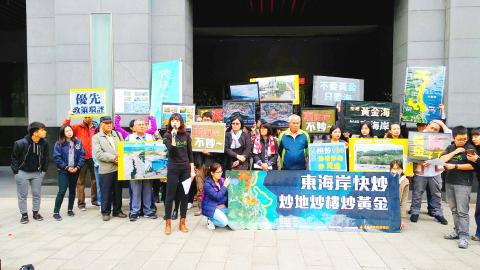A controversial resort project at Taitung County’s Shanyuan Bay (杉原灣) was yesterday returned to its supervising agency by an environmental impact assessment (EIA) committee, following strong opposition from local Aborigines and environmentalists.
The Golden Sea Resort Hotel (黃金海休閒渡假村) is one of four resort projects planned in the bay, with a development area of 11.32 hectares and investment of NT$260 million (US$8.9 million) near Highway 11.
In 2000, the project passed an EIA review, but the developer was required to file a new impact assessment in 2006 because it did not begin construction within three years after it was granted construction approval.

Photo: Liu Li-jen, Taipei Times
Yesterday’s meeting at the Environmental Protection Administration (EPA) headquarters in Taipei is the eighth committee review of the project.
Before the meeting, protesters rallied in front of the EPA building, urging the committee to halt the review until the Ministry of the Interior’s Construction and Planning Agency revealed its plans for the east coast.
In addition to the Golden Sea project, three other resort projects — the Miramar Resort Hotel, the Shanyuan Palm Beach Resort and the Naruwan Inn — are planned, Citizen of the Earth, Taiwan researcher Chan Yi-wen (詹壹雯) said.
The Supreme Administrative Court last year ruled that construction of the Miramar Resort Hotel was illegal.
The projected number of hotel rooms in demand by 2023 is about 68, but if the projects are approved there would be a total of 1,340 rooms available, Chan said.
Kaluluan community leader Tsai Kuei-fa (蔡貴發), an Amis, led yesterday’s protest, saying the proposed construction site overlaps the community’s traditional land.
However, the Council of Indigenous Peoples refused to include private properties in its demarcation of Aboriginal lands, the community said, adding that they would launch more demonstrations if the project proceeds.
The Tourism Bureau and the county government did not send any representatives to the meeting.
Many committee members said the developer’s marine ecology, coral coverage and cultural heritage surveys are flawed and unprofessional.
Under the advice of committee member and EPA Deputy Minister Chan Shun-kuei (詹順貴), the committee returned the project to the Tourism Bureau, based on Article 13-1 of the Environmental Impact Assessment Act (環境影響評估法).
The developer is required to submit ecological surveys, waste water disposal plans, geological safety reports and increase communication with local communities before resubmitting the project to the EPA.

Alain Robert, known as the "French Spider-Man," praised Alex Honnold as exceptionally well-prepared after the US climber completed a free solo ascent of Taipei 101 yesterday. Robert said Honnold's ascent of the 508m-tall skyscraper in just more than one-and-a-half hours without using safety ropes or equipment was a remarkable achievement. "This is my life," he said in an interview conducted in French, adding that he liked the feeling of being "on the edge of danger." The 63-year-old Frenchman climbed Taipei 101 using ropes in December 2004, taking about four hours to reach the top. On a one-to-10 scale of difficulty, Robert said Taipei 101

Nipah virus infection is to be officially listed as a category 5 notifiable infectious disease in Taiwan in March, while clinical treatment guidelines are being formulated, the Centers for Disease Control (CDC) said yesterday. With Nipah infections being reported in other countries and considering its relatively high fatality rate, the centers on Jan. 16 announced that it would be listed as a notifiable infectious disease to bolster the nation’s systematic early warning system and increase public awareness, the CDC said. Bangladesh reported four fatal cases last year in separate districts, with three linked to raw date palm sap consumption, CDC Epidemic Intelligence

Taiwanese and US defense groups are collaborating to introduce deployable, semi-autonomous manufacturing systems for drones and components in a boost to the nation’s supply chain resilience. Taiwan’s G-Tech Optroelectronics Corp subsidiary GTOC and the US’ Aerkomm Inc on Friday announced an agreement with fellow US-based Firestorm Lab to adopt the latter’s xCell, a technology featuring 3D printers fitted in 6.1m container units. The systems enable aerial platforms and parts to be produced in high volumes from dispersed nodes capable of rapid redeployment, to minimize the risk of enemy strikes and to meet field requirements, they said. Firestorm chief technology officer Ian Muceus said

MORE FALL: An investigation into one of Xi’s key cronies, part of a broader ‘anti-corruption’ drive, indicates that he might have a deep distrust in the military, an expert said China’s latest military purge underscores systemic risks in its shift from collective leadership to sole rule under Chinese President Xi Jinping (習近平), and could disrupt its chain of command and military capabilities, a national security official said yesterday. If decisionmaking within the Chinese Communist Party has become “irrational” under one-man rule, the Taiwan Strait and the regional situation must be approached with extreme caution, given unforeseen risks, they added. The anonymous official made the remarks as China’s Central Military Commission Vice Chairman Zhang Youxia (張又俠) and Joint Staff Department Chief of Staff Liu Zhenli (劉振立) were reportedly being investigated for suspected “serious